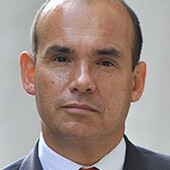Japan's corporate culture is in serious trouble, declare our two speakers. It's "sleepwalking to oblivion," says Michael Woodford, former Olympus CEO turned whistleblower. And according to journalist Michael Zielenziger, the Olympus scandal is an example of larger problems facing Japan's economy.
DAN BOBKOFF: Michael Woodford had just become CEO of Olympus when he blew the whistle on a $1.7 billion fraud at the company. Instead of dealing with the scandal, the board fired him for bringing it up. He says his experience at Olympus is part of a larger Japan problem. Its corporate culture and ethics are holding the whole country back.
MICHAEL WOODFORD: Japan is sleepwalking to oblivion. Something has gone very wrong with the top of their institutions.
DAN BOBKOFF: It’s not just corruption. Little diversity, not enough risk taking, and collectivism to the extreme—that’s what some say is at the root of Japan’s economic malaise.
MICHAEL ZIELENZIGER: You’re either in a group or you don't exist at all.
DAN BOBKOFF: I'm Dan Bobkoff. This time on Just Business: What’s wrong with Japan’s corporate culture? We will hear the story of Olympus from Woodford himself and author Michael Zielenziger on why he’s pessimistic about Japan’s future.
Michael Woodford had quite an eventful 2011. He became the first Western-born CEO of Olympus, the Japanese camera maker. But it took just weeks for things to unravel.
MICHAEL WOODFORD: I was a businessman. I was running a large corporation, with 40,000 people, visiting factories, sending emails, and going to meetings. Suddenly I found myself in a John Grisham novel, where I was the lead protagonist fearing for my life, fearing for the safety of my family, my children.
DAN BOBKOFF: Shortly after becoming CEO, Woodford learned of all sorts of misdeeds at Olympus. The company had merged and bought a number of firms that had no profits and nothing to do with cameras and imaging. One makes microwave dishes.
There was also Olympus cash heading to the Cayman Islands. It turns out the company was hiding big losses and bad investments—$1.7 billion in accounting fraud over 13 years.
Woodford confronted the board, and what followed, he said, was an eight-minute corporate execution. For being a whistleblower and corporate martyr, Woodford, to many, became a symbol of corporate responsibility.
He’s out with a book now about the incident, called Exposure.
I asked him about his brief tenure as a Western-born CEO of a Japanese company and what the experience says about the current state of Japanese business.
MICHAEL WOODFORD: Japan has a fascination with the West. Carlos Ghosn was the first, and Sir Howard Stringer at Sony. But I was different. These guys had been parachuted in, but I had worked for the company for 30 years. I had worked my way up the ranks. In Japan they call that “salaryman.” That demonstrates a loyalty and faithfulness to the company, which means a lot in Japan.
Now, you may just feel I was in my comfort zone and having a good time, but in Japan it means a lot. It actually means more to many people than personal fidelity. I’m sure if I’d had an affair, that wouldn’t have been an issue. But any disloyalty to the company would have been.
DAN BOBKOFF: So the problem seemed to be something of a corporate culture in Japan that worked for a time—worked for maybe a 20- or 30-year period—and then something went wrong in the last 20 years. Do you agree?
MICHAEL WOODFORD: Japan, from the rubble of the Second World War, rather like Germany, built up a huge industrial machine and copied and then did things better than Western companies. That may have been Kodak film with Fuji or old British Leyland cars with the Japanese superefficient, highly reliable vehicles they produced. What they had was obsessive attention to detail in the assembly process and the manufacturing process. That’s not special. You can be in Ohio or Manchester in England or in Toulouse in France. Manufacturing now is formatted. So they don’t have that lead anymore. Good manufacturing exists around the world.
What they are not doing, they’re not innovating. Their culture now is holding them back. You need people to think laterally, to be a bit crazy, to be a bit wacky. But the nail which sticks up in Japan, they say, will get nailed down.
The corporations want to change. They say, “We want to change.” They don't know how. They are hierarchical. People aren’t allowed to challenge, to question. They are hopeless at facing up to things which aren’t working, so there’s no closing of loss-making businesses. Women are basically ignored in the workplace, never mind in the boardroom. There are hardly any women at a middle level.
So young people, women—they’re neglecting that. They’ve got awful demographics. Their birthrate is the lowest in the developed world; the highest life expectancy, with all the cost of health care which goes with that; population shrinking by 800,000 a year. It’s a bad, bad place they’re at.
DAN BOBKOFF: And their corporate ethics seem to be different than in the West. It almost seems like scandals there are different than they would be here. Somebody said to me as I was researching this that there people steal to save the company; here people steal to pad their own pockets.
What is the culture there? And how does that lead to corruption?
MICHAEL WOODFORD: It’s an interesting point you make, Dan. I wouldn’t be so generous in the interpretation you give to it. Fraud, as we know, occurs in the United States, in England, and in Japan. What’s different there is the reaction to the fraud by the institutions. The media are not—
DAN BOBKOFF: Inaction, right? It’s not even action.
MICHAEL WOODFORD: Exactly. The media are passive. They do not like attacking Japanese Nikkei-listed companies. They won’t make the news. They will report it, but they won’t investigate. They were totally silent, for example, on the Olympus issue.
But if you want to see how the capital markets work in Japan, a month after my dismissal—which is a story in itself, which you can read in the book—the share price had fallen by 81.5 percent. Seven billion U.S. dollars had been struck off the value of the corporation. Yet the institutional shareholders, the large Japanese banks and insurance companies, would not make one word of criticism of the incumbent board or, conversely, one word of support for the ex-president who was going through purgatory trying to bring the bad things to the notice of those in the public domain.
That couldn’t happen here. The institutional shareholders here would have to act. Otherwise, they would become contaminated.
DAN BOBKOFF: It also seems that there was a very clubby, symbiotic relationship between government, the banks, and the corporations that worked for a while, but then actually led to a lot of these problems, right?
MICHAEL WOODFORD: To anyone who hasn’t been in Japan, I’m sure if they are listening to me or reading my book—“You must be joking. This can’t be true.” But it is like Alice in Wonderland. It really is bizarre. When the chairman, Kikukawa, fell, a few weeks after I was going around the world telling everyone what was happening, the head of the imaging business then became head of the Olympus business.
Again, the fraud was not subtle. It was almost comical. The company had bought three Mickey Mouse businesses—a face cream business, plastic plates for microwave, and a recycling business. But they had no turnover to speak of.
So he stood up there after the company had spent $1 billion—it was all over the newspapers—and he said, “Well, these businesses were very important for the future direction of the company.”
He’s either stupid or he’s blindly loyal or deluded. You just couldn’t get that—and then the journalists are all writing it down as if this is—it was so transparently nonsense. And you do feel like people are playing with pink flamingoes, croquet on the lawn. It’s just bizarre.
DAN BOBKOFF: How much do you think not having many outsiders—any diversity, really—in Japanese companies contributes to these problems?
MICHAEL WOODFORD: It’s the most ethnically pure society on Earth, in the developed world. They have problems in coming to terms with their past and the way they are seen. Much of Asia finds Japan arrogant. It’s a long, different subject.
But I had gone. The head of Nippon Glass left at the same time I was there, saying irreconcilable differences. Stringer has now been replaced with a Japanese. There’s only Carlos Ghosn.
Despite its decaying, it’s still the third-largest economy at the moment. But they need American know-how and management know-how. They need European know-how. You can’t manage a world business unless you have those cultures at a very senior level. Japan is closing up the drawbridge and becoming more and more insular.
DAN BOBKOFF: Do you see any signs that Japan is coming up with a new model? Are any of the soul-searchings actually working?
MICHAEL WOODFORD: No. That’s the worst part of it. I’ve become ever more pessimistic that Japan is sleepwalking to oblivion. It’s terribly sad. It’s a wonderful country, lovely people. But something has gone very wrong with the top of their institutions.
DAN BOBKOFF: You’ve become sort of a hero to corporate ethics experts, people in that field. What are the lessons from the Olympus case for other corporations, other countries? What’s specifically Japanese and what can we learn from that elsewhere?
MICHAEL WOODFORD: I don't think it is just Japan. Japan has real problems with its media and its large institutional shareholders. That’s a problem for Japan. That’s where they deny the undeniable. That’s a unique Japanese problem.
But we see every day, don’t we—we now have this big story on Hewlett Packard and Autonomy. There’s one every week almost. I think people are realizing that corporations — just take the salaries. A lot of people—schoolteachers, dentists, doctors, people working in stores—are saying, are these people worth the ever-increasing salaries? So the whole moral capitalism and greed at the top—personally, I think something has gone wrong.
And the shock of people that Michael Woodford would give up his highly paid job to do the right thing, that shocked me. I never thought it was such a—I was a person in that position, I found something wrong, and therefore I had to deal with it. Otherwise, I would become complicit. But what shocked me was that a lot of people were suggesting, “Gosh, you’re mad. Why did you do that?”
DAN BOBKOFF: It’s also fairly unusual for the CEO to be the whistleblower. Usually it’s someone in middle management, right?
MICHAEL WOODFORD: Yes. I had a board of 14 who totally closed ranks. Again, you wouldn’t believe it. And again, when I describe in my book the way they fired me, including the way they put their hands up when they wanted me to leave the boardroom—it was very, very disturbing. My hands go cold as I start to think back to those hours. Why would they possibly fire somebody with such a high profile in Japan? What were they scared of? Something much more than me going public.
DAN BOBKOFF: What would you say to someone who is thinking of becoming a whistleblower but is scared?
MICHAEL WOODFORD: It depends on the jurisdiction. If you’re in the United States, the rule of law works here and there’s a free media. If you are in Russia or China or Mexico, then my advice, frankly, would be very different because you can’t guarantee the security of the institutions.
My advice would be, if you know something is bad and wrong, and you don't do something, then you become complicit. You should fear the consequences that, at another point in time, you could be the person with the Securities and Exchange Commission knocking at your door. You could be the person with the FBI saying, “Why didn’t you act?”
A lot of things have been done in the United States to try to protect whistleblowers. Some of it I don’t actually agree with. Giving them huge amounts of money—you should protect them, but not as if you’ve won the lottery.
But I think the backdrop is changing. Whistleblowers used to be seen as awkward people who went off telling tales. That was how they were perceived by many. Now I think they are perceived as people who are standing up, they are being honest, and they should be respected for what they’re doing. I don't think it’s “all that’s bad ends in tears.” My story has a happy ending, and I think whistleblowers listening or potential whistleblowers listening should remember that.
DAN BOBKOFF: Michael Woodford is the author of Exposure: Inside the Olympus Scandal: How I Went from CEO to Whistleblower.
Michael Zielenziger, of Oxford Economics, is a longtime journalist and Japan-watcher. He’s also the author of Shutting Out the Sun. He says the Olympus scandal is an example of larger problems facing Japan’s economy.
MICHAEL ZIELENZIGER: Normally in Japan, it’s a very hierarchical society, where you are hired in the company right out of college, and you wait your turn to have any sort of power, and you wait around for 30 years for your turn. Remember, too, this is a society where if you don’t get hired right out of college, it’s very difficult for you to find a job in your 30s. The post-first-job hiring is very, very, very difficult, which is why so many Japanese only have part-time jobs. They have left that alleged job with a career and would prefer to work as freelancers or part-time workers for the freedom, rather than be in these jobs where they have to keep their mouth shut for 30 years before they have any power.
So there are tremendous incentives in the corporate system to just keep your mouth shut and do as you’re told and wait for your chance to lead.
DAN BOBKOFF: It didn’t really seem to make any waves in Japan until Michael Woodford really spoke up.
MICHAEL ZIELENZIGER: That’s because in Japan there’s a kisha club—a press club system. You’re either in the system, which allows you to go to press conferences or events, and you’re officially sanctioned as a member of the "club," or you’re an outsider. And outsiders in Japan have no place.
You have been in Japan and you see that people give one another business cards. The business cards are not to figure out your name; they’re to figure out your standing in society. If you don't have a business card, you’re a nobody.
The notion of individuation in Japan doesn’t exist the way it exists in our society. We believe everybody is a person, everybody has sort of grown up in the spirit of god or something, and we all have our individual talents to spread out across the globe. It’s also why we’re such a crazily individual society. The Japanese society is crazily collective. Everything is done in a group system. You’re either in a group or you don’t exist at all.
So the incentives to be in the group, to be in the company are extreme.
DAN BOBKOFF: This was a country that Americans and many in the West looked at in the 1970s and 1980s as a model. Everyone was trying to be more like the Japanese and fretting about it. Then all of a sudden they basically—
MICHAEL ZIELENZIGER: Fell apart.
DAN BOBKOFF: Right, exactly. I guess my question for you is, what are the lessons here?
MICHAEL ZIELENZIGER: First of all, diversity is very important. Japan is an incredibly homogeneous society. It blocks immigrants. It pretends that even Koreans who are born in Japan aren’t really citizens. So it doesn’t really give voice to different kinds of people.
Second, globalization is a two-way street. The Japanese have always wanted to export to the rest of the world—to buy their Sony TV sets, to buy their Panasonic radios—but have not really been open to import. Even now, we’re about to have a prime ministerial election campaign in Japan where most of the candidates running for the Diet, or the legislature, are against the notion of free trade across Asia. This is remarkable in the 21st century.
Third, the methods of accounting—social accounting, as well as economic accounting—can’t be perpetually short-circuited, because they lead to bad outcomes. Unless you can properly assess losses or companies that are ineffective and inefficient and redistribute them through some forms of creative destruction, then your society is kind of doomed to be in a downward cycle.
Now, there are parts of creative destruction that are unpleasant. It’s unpleasant when people lose their jobs. I’m not saying that there should be no social safety net. I’m not a hardcore free-marketer that way. But the Japanese system has clearly outlived its ability to respond to global changes. The world has changed remarkably in the 20 years since Japan was at its economic apex, and Japanese society has barely responded.
So in this new era of technology and incredibly quick change, Japan seems kind of resistant, wants to keep out all the forces that would make it face up to its reality.
DAN BOBKOFF: That’s Michael Zielenziger of Oxford Economics.
Leave us a comment on our website, carnegiecouncil.org/justbusiness. There you’ll find past episodes and lots of other great podcasts and videos from the Carnegie Council. That’s all for this edition of Just Business. We have production help from Madeleine Lynn and Terence Hurley. Thanks to Devin Stewart. Check out his podcast, Point B, also at carnegiecouncil.org. And thanks to Tony Higgins for our music.
You can find more episodes on iTunes and the Stitcher Smart Radio app.
I’m Dan Bobkoff. Thanks for listening.






